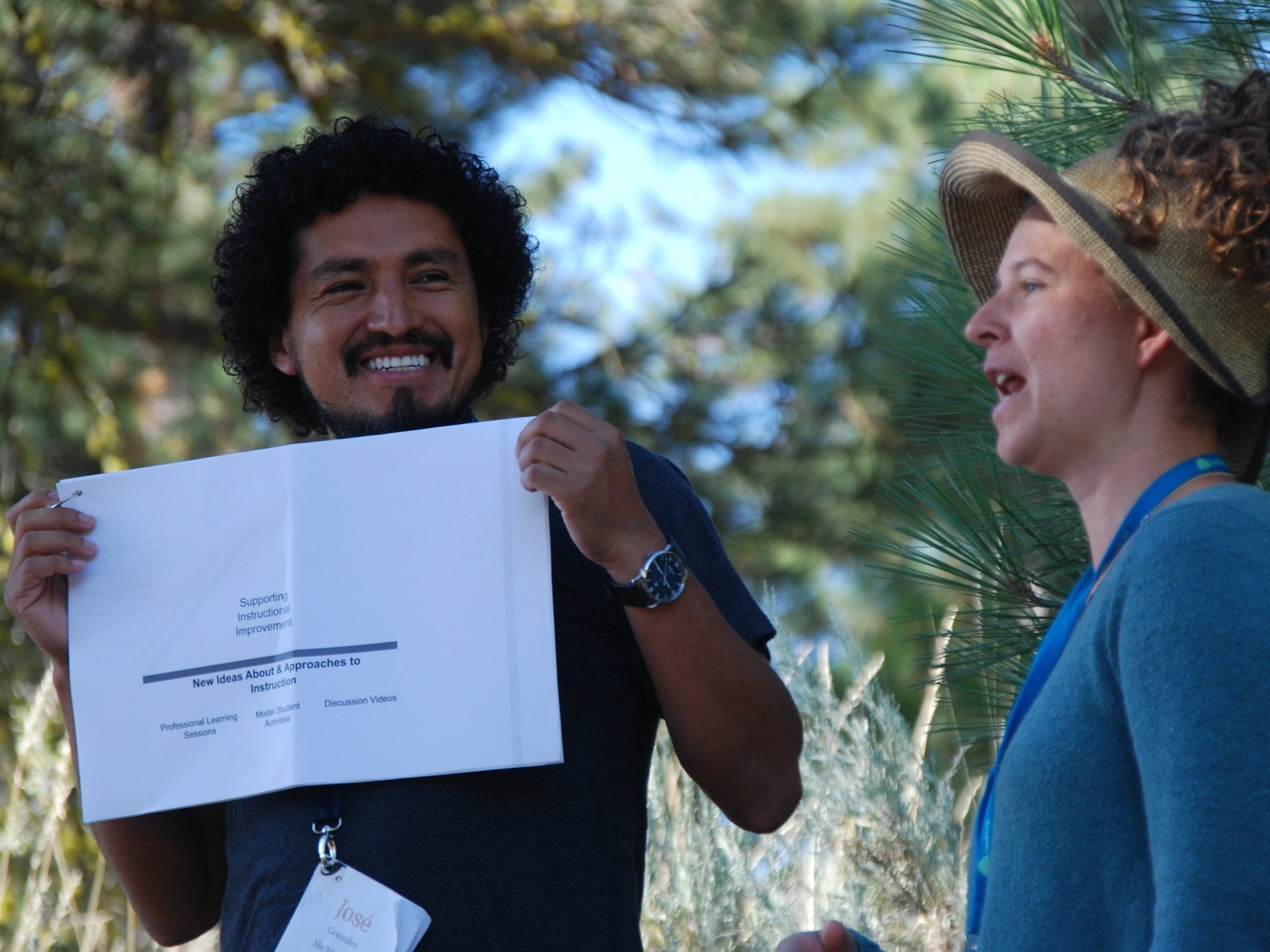The BEETLES Project — Outdoor Science
Here, we highlight The BEETLES Project at The Lawrence Hall of Science at University of California, Berkeley. BEETLES develops research-based professional learning, implementation support, and instructional resources that are specifically for the outdoors and are extensively tested, evaluated, and freely available at www.beetlesproject.org. BEETLES professional learning resources are exemplary of the high-quality materials and professional learning process that schools and districts should seek as they prepare teachers for going outside. Below, you will find an overview of their approach, which is centered on outdoor science instruction. At the end of this article and on our Outdoor Teaching and Learning Resources page you will find a list of other high-quality professional learning resources and organizations that are available to help.
Managing Students Outdoors
It is important for teachers to have confidence and know-how when it comes to managing a class outdoors. Some classroom teachers are particularly concerned about managing student groups outdoors and overcoming the perceived “distractions” that nature provides. Fortunately, there are many ways to address these concerns by harnessing student curiosity and setting up systems for managing the space and student behavior. The Outdoor Classroom Management article in this section provides strategies and tips for creating a successful outdoor experience. BEETLES also has a resource, Engaging and Managing Students in Outdoor Science, that can be shared with teachers and discussed in a professional learning setting. We recommend focusing on pages 10–15 and 32–36.
Using BEETLES Professional Learning Sessions
BEETLES has a collection of Professional Learning (PL) Sessions, two- to three-hours long, that are based on best practices in adult learning and have been tested by leaders of dozens of outdoor science programs with their instructors across the country. Each PL Session is based on the Learning Cycle (sometimes also referred to as 5E Lesson Design) and is designed to be an experience that inspires educators to thoughtfully examine and make shifts in an aspect of their instructional practice.
Below are some considerations drawn from the BEETLES Program Leaders Guide that will be helpful to instructional leaders who might be designing and facilitating professional learning to support teachers to work with students outdoors.
Selecting and Sequencing Professional Learning Sessions
BEETLES Professional Learning Sessions can be used flexibly — individually or carefully and thoughtfully sequenced together in a variety of ways to successfully achieve different goals. The sessions you choose and when you use them will depend on your specific goals, needs, and context. Figure 8, BEETLES Professional Learning Sessions At-a-Glance on page 11 of the Guide for Program Leaders in Outdoor Science, provides an overview of all the Professional Learning Sessions with comments about their use. Here is our curated list of Professional Learning Sessions (each about three hours long) that are suitable for use with classroom teachers (with a link to each):
The following is an example approach to sequencing BEETLES Professional Learning Sessions.
Practical Strategies >> Teaching Theory >> Science Pedagogy
This sequencing approach starts out with sessions that feel more practical and less theoretical. They allow teachers to jump right in and begin teaching outdoors immediately using some simple and powerful strategies and routines. It is sometimes easier to be open to and curious about theory after having success with practical strategies. These sessions can be delivered once a week over a seven-week period or once per month over an entire year or two, or they could be compressed into an intensive weeklong summer institute.
First: Practical Strategies
Then: Teaching Theory
Next: Science Pedagogy
All BEETLES Professional Learning Sessions include both theory and practice, but Making Observations, Field Journaling with Students, and Questioning Strategies are lighter on the theory and heavier on the practice related to nature-centered, student-centered teaching. Once teachers have some successful outdoor strategies under their belts, they will be ready to apply more teaching theory to their outdoor instruction by engaging in Teaching and Learning and Promoting Discussion. When teachers have some practice thinking about teaching theory and incorporating new research-based teaching methods, they can then deepen their knowledge of science pedagogy (Evidence and Explanations and Nature and Practices of Science).
Some professional developers might choose to spend a substantial part of their professional learning time immersing teachers in the teaching approaches from one or two BEETLES Professional Learning Sessions. For example, if helping teachers to develop their own outdoor instructional activities or units is a priority, it might be useful to spend a significant amount of time exploring the Teaching and Learning session and using the Learning Cycle as a planning tool for curriculum design.
Planning for Follow-up to Professional Learning Sessions
It takes time, practice, and reflection to become comfortable and skilled at teaching outdoors. Many leaders have recommended that the Professional Learning Sessions be introduced and spread out gradually over time (instead of all at once during a week or two). This rhythm allows teachers to apply each approach to their actual teaching before being introduced to the next one. Every BEETLES Professional Learning Session has a section titled “Applying Session to Instruction” that provides a variety of specific suggestions for following up with participants after that session. Leaders can use the “Applying Session to Instruction” section to create an ongoing process of reflection on outdoor teaching practices.
Leading BEETLES Professional Learning Sessions
Each Professional Learning Session should be read carefully and thoroughly before leading it with teachers. There are extensive, detailed preparation instructions in each one that are the result of widespread field testing. Almost all the Professional Learning Sessions incorporate one or more BEETLES student activities that participants experience first-hand to model teaching strategies. It would be ideal for the professional developer leading the session to teach these activities with students first. Each session takes about three hours to present. Several of the sessions have “how-to” videos to help professional developers envision what leading the session will be like. In particular, the “Meet the BEETLES” video provides one quick and easy way to introduce outdoor teaching to your staff.
Using BEETLES Student Activities as Professional Learning
In addition to Professional Learning Sessions, BEETLES has dozens of high-quality Student Activities, including explorations, investigations, discussion routines, and reflections, that teachers can use directly with their own students. Most are appropriate for grades 4–8.
BEETLES student activities can be used to create professional learning experiences for teachers. You can introduce BEETLES student activities to teachers before presenting the Professional Learning Sessions. This allows teachers who are new to outdoor instruction to get a feel for it. If you use this “try it out first” approach, encourage teachers to lead the activities as written, since they may be tempted to skip steps of the learning cycle or convert broad questions to narrow, which might shorten the time needed to teach them but will undermine their effectiveness. After teachers have some experience leading model activities with students outdoors, they will be able to draw on those experiences to get more out of the Professional Learning Sessions. Even if you never use the learning sessions, teachers who teach BEETLES student activities can meet together to discuss the attributes of the activities, what worked, what they struggled with, and how they might try something different next time.
Building a Culture of Reflection
Establishing a somewhat formalized “professional learning community” can encourage teachers to learn from each other and become more comfortable teaching outdoors. This is especially important when a group of teachers is trying something new together. A professional learning community should establish a clear goal, such as “creating the best possible outdoor learning experiences for our students.” Schools that actively cultivate openness and growth among teachers explicitly state a goal of exploring strategies to improve learning. They provide meeting time for teachers to share examples of student work or debrief how a new activity went in order to learn what works best. This is particularly important in helping teachers to quickly gain facility teaching in what for many will be a new context — outdoors. During the pandemic, many schools have dedicated days for teachers to be in community with other teachers. These already established school structures are a perfect opportunity to build a culture of reflection around teaching outdoors.
Credits
This program highlight was written by Craig Strang of The Lawrence Hall of Science at University of California, Berkeley.
National COVID-19 Outdoor Learning Initiative
The National COVID-19 Outdoor Learning Initiative supports schools and districts around the country in their efforts to reopen safely and equitably using outdoor spaces as strategic, cost-effective solutions to increase physical distancing capacity onsite and provide access to abundant fresh air. The Initiative seeks to equitably improve learning, mental and physical health, and happiness for children and adults using an affordable, time-tested outdoor approach to keeping schools open during a pandemic.














